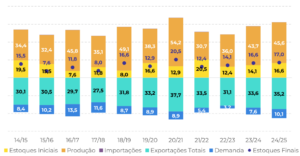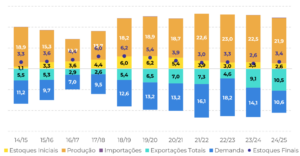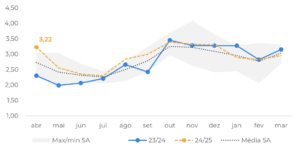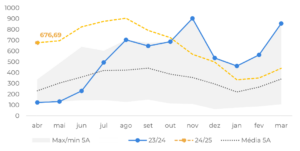Coffee harvesting in Brazil: prospects and challenges
Check out the prospects and challenges for the next coffee harvest in Brazil, with Laleska Moda, Market Intelligence Analyst at Hedgepoint.
The 2024-2025 coffee harvest is gathering pace in Brazil with its peak expected in June and July. Robusta and arabica coffee are important export products for the country, and this crop’s yield directly impacts the economy.
This year, several variables have impacted coffee plantations in the main producing states. That’s why Laleska Moda, Market Intelligence Analyst at Hedgepoint, told us more about this year’s harvest prospects and export estimates.
Check out what she has to say about the current harvest. Happy reading!
The current state of the Brazilian coffee market
Brazil is an important coffee exporter globally, ranking first in Arabica coffee and second in robusta, known locally as conilon. There are more than 104 variations of the bean worldwide, but these are the two most consumed globally.
The state of Minas Gerais is the largest producer of Arabica coffee, followed by São Paulo and Espírito Santo. Robusta coffee production is led by the state of Espírito Santo, followed by Bahia. Among the main international destinations for these beans are:
- United States;
- Germany;
- Belgium;
- Italy;
In recent years, there has been a new increase in demand for Brazilian coffee. Hedgepoint’s Market Intelligence Analyst, Laleska Moda, says that a deficit in robusta coffee production in Vietnam and Indonesia, two big names in exports, has brought new demand to Brazil. According to her, the former has seen a significant reduction in the area under cultivation and the latter has suffered from climatic phenomena that have impacted its production yield.
These factors have influenced coffee values on the market. At the end of 2023 and the beginning of 2024, product prices rose due to the reduction in supply. However, this proved to be a new prospect for the export of Brazilian crops.
“Today, the foreign market is very dependent on Brazilian coffees. However, supply may not keep up with such high demand,” says Laleska.
This information can also be verified in the latest data collected by Hedgepoint on the supply and demand of Brazilian coffees:
Supply & Demand – Arabica – Brazil (M scs)

Supply & Demand – Conilon – Brazil (M scs)

Read also:
- What is the situation with the 24/25 wheat harvest in Brazil and Argentina?
Challenges and prospects for the coffee harvest in Brazil
Brazil’s 24/25 coffee harvest is still underway. According to Moda, some natural variables impacted this year’s Brazilian crop, but it’s still too early for more complete data on its yield.
Robusta Coffee went through a troubled climatic period in the last few months of 2023. High temperatures in Espírito Santo led to a major drought in the region. However, higher rainfall in 2024 led to a partial recovery and improved forecasts for the crop.
 “For this reason, production is still expected to be within the average for conilon coffee, both in Espírito Santo and Bahia. However, attention is needed! There has recently been a further reduction in crop yields, especially in Espírito Santo, due to irregular rainfall in recent months,” says Laleska.
“For this reason, production is still expected to be within the average for conilon coffee, both in Espírito Santo and Bahia. However, attention is needed! There has recently been a further reduction in crop yields, especially in Espírito Santo, due to irregular rainfall in recent months,” says Laleska.
As for Arabica coffee, the weather didn’t make the same recovery. Rainfall was also lower than expected during bean filling in parts of Minas Gerais and São Paulo. This could also compromise the yield of this coffee bean in the country.
The influence of La Niña on the coffee harvest
Climatic phenomena have always affected the production of any agricultural crop. La Niña is a case in point. According to Moda, this event is expected to have its effects on coffee, but not for this production season.
According to the professional, changes in the climate are only expected for the third quarter of the year, when the Brazilian harvest is already finished. In countries like Vietnam, El Niño will still influence current plantations, reducing the rainfall expected by producers.
In Brazil, the days are expected to continue to be hotter and drier during the end of the 24/25 harvest, but there is also a risk that these conditions will persist until the start of the 25/26 season. According to Laleska, the dry weather will maintain the quality of the grain and the yield of the ongoing harvest. However, it could also negatively affect the start of the next season and the development of the next grains.
Read also:
- Brazil’s trade balance: understand the importance of commodities
What are the export estimates for Brazilian coffee?
With the reduction in production in Vietnam and Indonesia, Brazil is already exporting more coffee than ever before. In 2023, the country reached record levels and forecasts for 2024 are even better. Last April, Brazil recorded a 53.3% increase in coffee exports compared to the same period last year.
Below you can also see the export figures for each Brazilian coffee in recent months. The graphs compiled by Hedgepoint show considerable growth, especially for robusta coffee:
Green Conilon Exports – Brazil (‘000 scs)

Green Arabica Exports – Brazil (M scs)

“This season, the first data already indicates a high export estimate, especially for robusta coffee. This bean will provide part of the demand that will not be met by the two Asian countries,” confirms Hedgepoint’s Market Intelligence analyst.
As indicated by Moda, the expected figures are optimistic. For arabica coffee, exports of 35.2 million bags are estimated for the 24/25 harvest. Robusta coffee, on the other hand, could generate around 10.5 million bags of exports – a figure that already exceeds the previous year.
Market intelligence contributes to more assertive decision-making
This year’s coffee harvest is delicate in terms of supply and demand, especially for robusta coffee. Prices are therefore expected to remain sustainable.
Brazil continues to be a major world player this season. That’s why it’s important to follow all the information on the development of the harvest to make a reliable forecast of coffee prices.
At Hedgepoint HUB, you have access to a complete platform with courses and content produced by those who work with coffee hedging. Check it out and make decisions based on important data and reports for your business.






